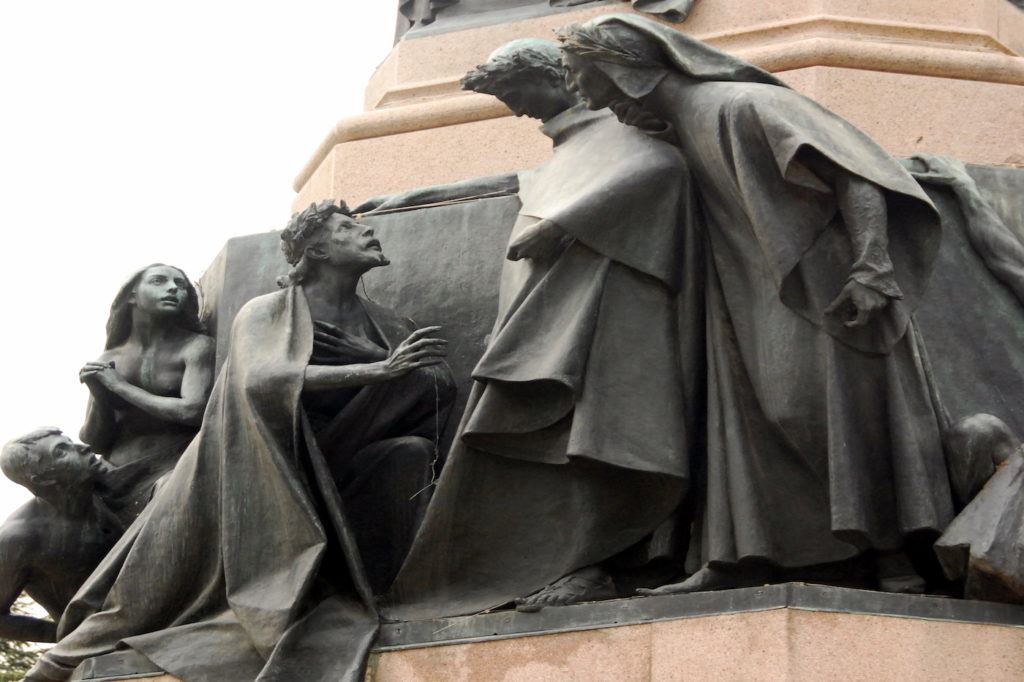Transience is now a defining feature of many people’s lives. Instead of staying in the same hometown, community, and job through adulthood, modern life insists that we uproot, then uproot again, to pursue the next coveted role or experience. This endless flurry of classmates, colleagues, and friends often leaves us feeling detached and disengaged. In the midst of drifting in and out of commitments, Americans report fewer friendships and atrophying support systems in a society fractured by economic upheaval and pandemic disruption.
Worse still, our increasingly online culture seems to be encouraging and enabling the fraying of the social fabric. Yuval Levin recently commented that more of us live as “functional loners.” We rely on the internet to “mediate different parts of our real-world experience” in a way that allows us to meet our needs “with a minimum of eye contact or interpersonal risk.” We’re getting to a point, he argues, where we can go days with little to no meaningful interaction. As a result, our daily lives are permeated with what Levin calls a “pathological passivity” and “social inertness.”
In an age of rising transience, we are confronted with the question of how best to respond—and, in particular, how best to understand ourselves in relation to the people and places around us. There’s not much of an option to simply disengage from the issue, as a degree of transience remains in our lives whether we like it or not. Even for those of us who yearn for a kind of rootedness, we often find ourselves complicit in the unraveling of social ties.
But there is an alternative way of thinking about the meaning of friendship. For a vision of a world in which friendship is paramount and theologically suggestive, we might consider Dante’s Purgatorio. This is the second part of his Divine Comedy, an epic three-part narrative poem composed in the early fourteenth century that depicts Dante’s journey through Hell (Inferno), Purgatory (Purgatorio), and Heaven (Paradiso). A medieval Christian allegory representing the journey of the soul toward God, the poem offers a compelling account of friendship that challenges us to reflect on our engagement with those around us and, ultimately, with God.
Start your day with Public Discourse
Sign up and get our daily essays sent straight to your inbox.Throughout Purgatorio, Dante makes a powerful case that friendship—however fleeting—is integral to both human flourishing and the human person because it prepares us for union with God. Dante’s medieval wisdom on friendship provides helpful guidance as we navigate our own strange nomadic landscape in the modern world.
Ascending the Mountain
Purgatorio depicts Dante’s ascent of Purgatory. He describes Purgatory as a mountain featuring seven levels (ascending through the seven deadly sins of pride, envy, wrath, sloth, avarice, gluttony, and lust) with the Garden of Eden at the top, symbolizing the state of wholeness Dante seeks. Purgatory represents the Christian life of repentance—“In which the human spirit from sinful blot / Is purg’d, and for ascent to Heaven prepares.” The ascent up the mountain of Purgatory straightens and restores souls made crooked by the world and “scrape[s] away the scales” of sin.
Friendship is central to this story of restoration. For Dante, restoration of the human soul is enabled by the aid of others. Throughout the poem, no character ascends the mountain alone. This is clear from the outset, with Virgil serving as Dante’s guide. Dante meets Virgil at the beginning of the Divine Comedy, where Dante admits, “I found myself in a dark wilderness, / for I had wandered from the straight and true.” Virgil joins Dante on the road. As Dante stumbles farther into the deepest wood, Virgil tells Dante, “And so I judge it would be best for you / to follow me, and I will be your guide.” Virgil then leads Dante through the depths of the Inferno, then up Mount Purgatory. Early in the ascent, Dante remarks, “I drew close to my faithful friend and guide—/ and without him what would have been my course? / Who would have led me up the mountainside?”
For Dante, friendship is a prerequisite for human flourishing because of our inherent dependence on others.
Dante’s ascent features many different forms of friendship. While Virgil personifies reason, thereby suggesting the extent to which friendship can be grounded in the ordered pursuit of a shared goal, there are also many friendships based on love and geniality. Early in his journey, Dante meets an old friend Casella, a musician who set Dante’s poems to music when they resided in Florence together. What’s particularly noteworthy is the warmth between the two friends once they’re reunited. Casella sees Dante at the base of the mountain and, “moved by love and joy,” rushes forward to embrace him.
There are other examples of patterns of love and geniality as Dante and Virgil embark on their journey. As Dante reaches the top of the mountain, Virgil hands him off to the “more worthy” guide Beatrice, who exemplifies love and divine revelation. Dante and Virgil extend this warmth themselves earlier in the ascent when they encounter a group of souls, one of whom asks Virgil to show them the way. Virgil responds in kind, “we’re pilgrims too, / travelers like yourselves.” Geniality among the souls is due, in part, to recognizing one another as fellow pilgrims—those also in desperate need of grace.
For Dante, our journey through life is necessarily relational. As we read his account of his ascent of Mount Purgatory, three key points about friendship emerge. First, friendship is clearly seen as a prerequisite for human flourishing because of our inherent dependence on others. Dante’s pilgrimage is entirely dependent on Virgil, Beatrice, and the many souls he meets along the way. Second, friendship comes in a diversity of forms, expressing different aspects of human nature, such as reason, love, and geniality. Dante recognizes and celebrates this diversity. Finally, friendship often arises in unpromising situations, with the mountain of Purgatory presenting a remote, lonely, austere setting that nevertheless provides the basis for Dante’s encounters with a myriad of wise and loving companions.
With Dante’s model of friendship in mind, we can already begin to see that what Levin calls “pathological passivity”—falling away from communal life and obligations—is not an option for a life of joy or of restoration. We depend on others to accomplish the work given to us, to share moments of joy and love, and to live a fulfilling life—a reality that is easily overlooked in our atomized lives.
Friendship As Preparation for Union with God
Beyond our everyday interactions with those around us, Dante’s idea of friendship offers deeper theological and metaphysical meaning. His model of friendship as central to human nature is understood in Aristotelian terms of ends and goals. As Aristotle notes, a thing can be understood in relation to its goal, such that an acorn (for example) can be understood as existing to grow into a tree. Similarly, Dante understands humans as existing to know, love, and depend on others. We are inherently relational, social, and dependent beings, who cannot meet our needs but through the help of others.
Dante extends this Aristotelian logic, suggesting that communion with others is fundamental to our highest good as embodied human souls. Friendship prepares us for our ultimate end: perfect communion with God, who is himself a community of persons. Human friendship points us toward the one friendship that the mountain of Purgatory is meant to restore: the friendship between God and man. Dante’s winding road up the mountain—aided by his many friends who encourage, rebuke, and guide him—serves the purpose of preparing him to gaze upon God and to come to know and to love God for eternity. Friendship transcends the necessities of this earthly life as it participates in the divine love that, as Dante puts it in his extraordinary depiction of the soul’s final union with God, “moves the sun in heav’n and all the stars.”
However, friendship isn’t just a means to seeing God. Dante describes an ongoing, dynamic movement between love of neighbor and love of God. We rise from human friendship to the love of God, and we are then brought back to the diversity of the created world once again. “I climb that I may be no longer blind,” declares Dante towards the end of his ascent. Dante’s journeying up the mountain heals his sight, so that he may look upon God. In doing so, he gazes upon those around him with restored sight. Once on top of the mountain, Dante sees a woman who “looked / as if her flesh and bones were emerald.” As Dante’s love of God grows, he sees and loves his neighbors with renewed eyes. Similarly, we see and love the vast diversity of souls with whom we share the cosmos through our communion with God.
Modern forms of transient or isolated living deny what it means to be human—our goal of knowing our neighbors and, ultimately, knowing God.
In this way, Dante’s Purgatorio illustrates that modern forms of transient or isolated living deny what it means to be human—our goal of knowing our neighbors and, ultimately, knowing God. In his view, there is no option to withdraw or harden our hearts toward others.
The Value of Fleeting Friendships
There is another seemingly humble yet important way in which Dante expresses the value of friendship. His poetic universe, like our own modern world, is full of people continually entering and exiting one another’s lives. Some exit permanently and others, like Casella, return unexpectedly. More than just advise us to avoid detachment, Dante shows us how we might receive the people in front of us wholeheartedly. In particular, he invites us to recognize those around us as fellow pilgrims, also reliant on others to achieve union with God.
For example, we might consider Dante’s portrayal of the slothful. About halfway up the mountain, Dante and Virgil come across the souls who must be purged of their lukewarm love. These souls’ contrapasso, or punishment, is to run up the mountain. The slothful souls are among the most joyful on the mountain, as they encourage one another to literally run the good race together. “Come on, come on, don’t let time slip away” cries one of the runners. “Zeal in well-doing makes grace green again!” The souls rely on one another to persevere on their arduous journey up the mountain. They are only with each other for a short season, accompanying one another as they are purged of sloth, before each ascends to different parts of the mountain.
We know this same pattern of temporary relationships all too well: the number of hometown friends we keep up with naturally dwindles; our office buddies move to other roles; we commit to one-year opportunities, knowing they will end in our uprooting; sometimes we simply naturally drift from friends, as our respective loves are reordered over time.
Dante pushes back against our temptation to be indifferent toward those whose presence in our lives we know will be temporary. The short-term friends we stumble across are, in fact, fellow travelers up the mountain, given to us for our own enrichment. As Bonhoeffer writes, “it is grace, nothing but grace,” to be given friends. We ascend the mountain with and through the company of others. Though some friends (like Virgil to Dante) join us all the way up the mountain and others (like the runners) are only with us for a short while, both kinds are a gift. Thus, our first disposition toward transient friends should not be detachment, but gratitude.
Although some friendships must be brief, they can still be accepted and committed to fully. We are, after all, accompanying others on their respective roads. Our next disposition, therefore, is one of engagement. When we see a fellow traveler up the mountain—perhaps a temporary classmate, colleague, or friend—Dante exhorts us to use our time to know and cherish them. Like the slothful running up the mountain, we are to encourage one another to “come on, come on.”
Dante’s wisdom on friendship became most salient to me this past year. After moving to a particularly transitory city, a group of friends and I joined a number of others and read through The Divine Comedy together over the course of a few months. Each week, our discussions drifted back to navigating what Dorothy Day aptly called “the long loneliness” of our newfound transient lives. Cups of hot tea in hand, we followed Dante up the mountain, where we learned that we too are inherently dependent on others and that even seasonal friendships prepare us for communion with God. We also learned that, though our time together in our transient city will probably be brief, we can delight in whatever time we do share, knowing “we’re pilgrims too, / travelers like yourselves.”












